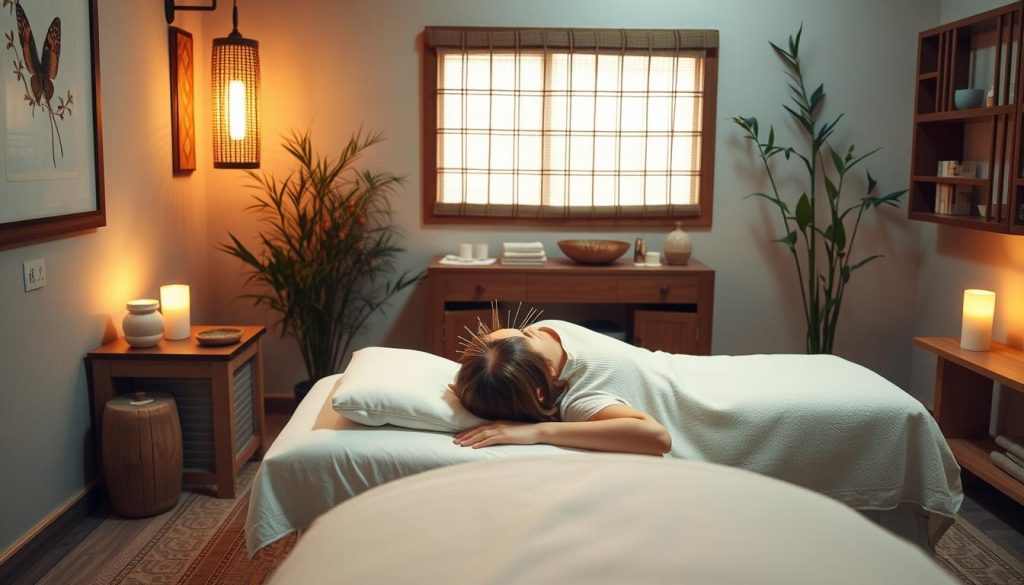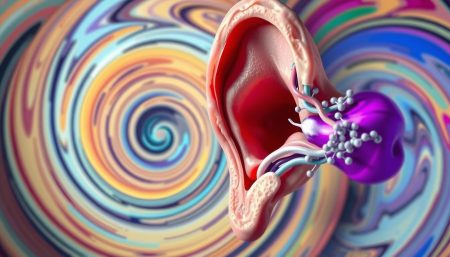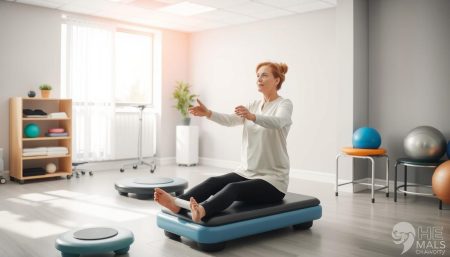Do you often feel dizzy and struggle with balance? You’re not alone. Vertigo affects millions, making everyday tasks hard. This guide will show you seven effective ways to treat vertigo and improve your life.
We’ll look at both medical treatments and natural remedies. Whether you have occasional dizziness or ongoing balance issues, these methods can help. They offer relief and ways to manage your symptoms.
Are you ready to fight vertigo? Let’s explore these powerful strategies. They can help you find your balance and take back control of your life. The right approach can greatly improve how you manage vertigo and its impact on your daily activities.
Understanding Vertigo: Causes and Symptoms
Vertigo makes you feel like you’re spinning, which can really mess up your day. It comes from problems in the inner ear, messing with your balance and sense of space. Vertigo symptoms can be anything from a little dizzy to really sick, affecting lots of people.
Common Types of Vertigo Disorders
There are many reasons vertigo happens:
- Benign Paroxysmal Positional Vertigo (BPPV)
- Meniere’s Disease
- Vestibular Neuritis
- Vestibular Migraines
BPPV happens when tiny crystals in your ear get out of place. Meniere’s disease is when fluid builds up. Vestibular neuritis is from inflammation in the inner ear. Vestibular migraines are headaches with vertigo.
Identifying Vertigo Warning Signs
Spotting vertigo early is key to handling it well:
| Warning Sign | Description |
|---|---|
| Dizziness | Feeling unsteady or lightheaded |
| Nausea | Feeling sick to your stomach, often with vomiting |
| Balance issues | Having trouble walking or standing straight |
| Tinnitus | Ringing or buzzing in the ears |
Distinguishing Vertigo from Other Balance Issues
Vertigo is different from just feeling dizzy or off-balance. It makes you feel like you or things around you are moving, even when they’re not. Unlike simple balance problems, vertigo can last a long time and get worse with head movements.
“Vertigo is not just feeling dizzy. It’s a specific type of dizziness where you feel like you or your surroundings are moving when they’re actually still.”
Knowing the difference helps find the right treatment and manage vertigo better.
How to Cure Vertigo Through Medical Treatment
Medical treatments can help with vertigo and balance issues. They include prescription drugs and professional procedures. These options can ease symptoms and improve life quality for those with vertigo.
Prescription Medications for Vertigo Relief
Doctors often give medications to help with vertigo. Antihistamines reduce dizziness and nausea. Anti-nausea drugs help with motion sickness. Diuretics might be used to manage fluid buildup in the inner ear, a common vertigo cause.

Professional Medical Procedures
Vestibular rehabilitation therapy is a special physical therapy. It helps retrain the balance system. Exercises are designed to lessen dizziness and boost stability.
For some vertigo types, doctors might do the Epley maneuver. This procedure moves inner ear crystals back into place.
When to Seek Emergency Care
While most vertigo episodes can be handled at home, some need urgent care. Seek emergency help if vertigo comes with:
- Severe headache
- Chest pain
- Difficulty speaking
- Sudden vision changes
- Weakness on one side of the body
These signs could mean a serious issue that needs quick attention and treatment.
Effective vertigo treatment often combines medical help and lifestyle changes. Work with your healthcare provider to create a plan that fits your needs and symptoms.
The Epley Maneuver: Step-by-Step Guide
The Epley Maneuver is a simple way to cure vertigo, especially for those with Benign Paroxysmal Positional Vertigo (BPPV). It involves a series of movements that can quickly ease dizziness. It’s considered one of the most effective vertigo exercises.
- Sit on your bed with a pillow behind you.
- Turn your head 45 degrees to the affected side.
- Quickly lie back with your head on the pillow, maintaining the 45-degree angle.
- Hold this position for 30 seconds.
- Without lifting your head, turn it 90 degrees to the opposite side.
- Wait another 30 seconds.
- Roll onto your side, keeping your head in the same position.
- Slowly sit up and remain still for a few minutes.
The Epley Maneuver works by moving calcium crystals in your inner ear. These crystals often cause vertigo. Many people feel better after just one or two sessions, making it a popular dizziness remedy.
| Epley Maneuver Success Rate | Number of Sessions |
|---|---|
| 80% | 1-3 sessions |
| 92% | 4-6 sessions |
| 97% | 7+ sessions |
While the Epley Maneuver is generally safe, talk to your doctor before trying it. This is especially important if you have neck or back problems. For persistent symptoms, getting professional advice is key to finding other vertigo treatment options.
Natural Remedies and Lifestyle Changes for Vertigo Relief
Natural remedies for vertigo offer hope to those seeking alternative solutions. These approaches can complement medical treatments and help in managing vertigo symptoms effectively.
Essential Oils and Herbal Solutions
Ginger and peppermint oils are popular natural remedies for vertigo. Apply them to your temples or inhale their scent to ease dizziness. Ginkgo biloba, a herb known for improving blood flow, may reduce vertigo episodes.
Dietary Modifications for Prevention
Certain foods can trigger vertigo symptoms. A low-salt diet helps manage Meniere’s disease, a common cause of vertigo. Avoid caffeine, alcohol, and processed foods to reduce the risk of episodes.
| Foods to Avoid | Foods to Include |
|---|---|
| High-sodium foods | Fresh fruits and vegetables |
| Caffeine | Whole grains |
| Alcohol | Lean proteins |
| Processed foods | Nuts and seeds |
Hydration and Sleep Habits
Proper hydration is crucial in managing vertigo symptoms. Aim for 8 glasses of water daily. Good sleep habits can reduce vertigo occurrences. Maintain a consistent sleep schedule and create a relaxing bedtime routine to improve your overall well-being.
“Incorporating natural remedies and lifestyle changes can significantly improve your quality of life when dealing with vertigo.”
Vestibular Rehabilitation Exercises
Vestibular rehabilitation helps manage balance disorders and vertigo. It uses exercises to retrain the brain and improve balance. Vertigo exercises are a big part of this treatment.
The main types of vestibular rehabilitation exercises include:
- Gaze stabilization exercises
- Balance training
- Habituation exercises
Gaze stabilization exercises improve eye movement control. They help reduce dizziness and improve vision during head movements. Balance training makes you more stable and less likely to fall. Habituation exercises help you get used to movements that cause vertigo, making symptoms less over time.
A typical vestibular rehabilitation program might include:
| Exercise Type | Frequency | Duration | Expected Benefits |
|---|---|---|---|
| Gaze Stabilization | 3-4 times daily | 5-10 minutes | Improved visual stability |
| Balance Training | 2-3 times daily | 10-15 minutes | Enhanced postural control |
| Habituation Exercises | 1-2 times daily | 5-10 minutes | Reduced vertigo symptoms |
Start slowly and increase the intensity of these exercises gradually. Always do vertigo exercises with a healthcare professional to ensure safety and effectiveness. With regular practice, many people see big improvements in their balance and quality of life.
Alternative Therapies for Managing Vertigo
Looking into natural remedies for vertigo can help those who don’t want traditional medicine. These methods aim to fix the causes of dizziness and balance problems.
Acupuncture and Acupressure Points
Acupuncture, an old Chinese method, might ease vertigo symptoms. It involves putting thin needles in certain body spots to balance things out. Acupressure, on the other hand, uses finger pressure on these spots for relief.

Chiropractic Treatments
Chiropractic care is all about keeping the spine aligned for better health. Some people with vertigo find help in gentle neck and spine adjustments. These might boost blood flow and nerve function, cutting down on dizziness.
Mindfulness and Stress Reduction
Stress can make vertigo worse. Mindfulness, like meditation and deep breathing, can help control stress. Doing these regularly might cut down on vertigo attacks and boost your mood.
| Alternative Therapy | Potential Benefits | Considerations |
|---|---|---|
| Acupuncture | May reduce dizziness frequency | Seek certified practitioners |
| Chiropractic Care | Can improve spinal alignment | Discuss medical history first |
| Mindfulness | Reduces stress-related symptoms | Requires consistent practice |
When trying these alternative vertigo treatments, talk to a healthcare expert first. They can help mix these methods with usual treatments for a full management plan for your symptoms. Remember, what works for one might not work for another. So, be patient and keep trying until you find the right mix of dizziness remedies.
Prevention Strategies and Long-term Management
Living with vertigo can be tough, but there are ways to prevent and manage it. By making lifestyle changes and staying proactive, you can lessen the impact of balance disorders. This makes daily life easier.
Regular exercise is crucial for managing vertigo. Try activities like tai chi or yoga. These improve balance and coordination, helping your vestibular system and reducing vertigo attacks.
Changing your diet is also important. Avoid salt, caffeine, and alcohol, as they can trigger vertigo. Instead, eat a balanced diet full of vitamins and minerals that help your inner ear.
Stress Management Techniques
Stress can make vertigo worse, so managing it is key. Here are some ways to reduce stress:
- Deep breathing exercises
- Progressive muscle relaxation
- Meditation or mindfulness practices
- Regular sleep schedule
Good sleep habits are vital for managing vertigo. Aim for 7-9 hours of sleep each night. Also, create a relaxing bedtime routine to improve sleep quality.
| Prevention Strategy | Benefits |
|---|---|
| Regular exercise | Improves balance and coordination |
| Dietary modifications | Reduces triggers and supports inner ear health |
| Stress management | Decreases symptom intensity and frequency |
| Proper sleep habits | Enhances overall well-being and symptom control |
Remember, managing vertigo is a continuous journey. Keep in touch with your healthcare provider. Attend regular check-ups to monitor your condition and adjust your treatment plan as needed.
Home Safety Modifications for Vertigo Sufferers
Living with vertigo can be tough, but smart home changes can help a lot. By focusing on preventing falls and making your home safe, you can lower vertigo risks. This makes life better and safer.
Creating a Safe Living Environment
First, get rid of tripping hazards like loose rugs and clutter. Install grab bars in bathrooms and handrails on stairs for support. Good lighting is key, so add nightlights in hallways and bathrooms.
These simple steps can greatly help manage vertigo symptoms at home.
Emergency Response Plans
Make a clear plan for emergencies. Keep a phone nearby and program important numbers for quick calls. Wearing a medical alert device can also give you peace of mind.
Share your vertigo treatment plan with family or neighbors. They can check on you regularly.
Adaptive Equipment and Tools
Look into adaptive tools to stay independent with vertigo. Long-handled reachers help you grab things without bending. Non-slip mats in the shower and bathtub add traction.
A raised toilet seat or shower chair makes bathroom activities safer. These tools support your vertigo treatment and help you feel confident in daily tasks.
FAQ
Q: What are the most common causes of vertigo?
A: Vertigo can be caused by several things. Benign Paroxysmal Positional Vertigo (BPPV) is a common cause. So are Meniere’s disease, vestibular neuritis, and vestibular migraines. Head or neck injuries, certain medicines, and inner ear infections can also cause it.
Q: How can I tell if I have vertigo or just regular dizziness?
A: Vertigo makes you feel like you’re spinning or the room is moving. Dizziness is more like feeling lightheaded or unsteady. If you feel like you’re spinning, it’s probably vertigo.
Q: What is the Epley Maneuver and how does it help with vertigo?
A: The Epley Maneuver is a set of head movements. It treats BPPV by moving crystals in the inner ear. It’s very effective for BPPV vertigo and can give quick relief.
Q: Are there any natural remedies that can help alleviate vertigo symptoms?
A: Yes, natural remedies can help with vertigo. Ginger tea, peppermint and lavender essential oils, staying hydrated, and stress-reduction techniques like deep breathing and meditation can help. Always talk to a healthcare provider before trying new treatments.
Q: When should I seek emergency medical care for vertigo?
A: Get emergency care if you have severe headache, chest pain, trouble breathing, sudden vision or hearing changes, loss of consciousness, or can’t stand or walk. These could mean a serious problem.
Q: What types of exercises can help with vertigo?
A: Vestibular rehabilitation exercises are great for vertigo. They include gaze stabilization, balance training, and habituation exercises. The Brandt-Daroff exercise is also good, especially for BPPV.
Q: Can dietary changes help prevent vertigo episodes?
A: Yes, changing your diet can help. Limit salt, avoid trigger foods, cut down on caffeine and alcohol, and drink plenty of water. Some people find a low-tyramine diet helps with vestibular migraines.
Q: Is it safe to drive when experiencing vertigo?
A: No, it’s not safe to drive with vertigo. The dizziness and disorientation can make it hard to drive safely. If you get vertigo often, have a plan for getting around without driving.
Q: Can stress contribute to vertigo symptoms?
A: Yes, stress can make vertigo worse. Stress management like mindfulness meditation, deep breathing, and exercise can help. These can reduce how often and how bad vertigo episodes are.
Q: Are there any home modifications that can help prevent falls due to vertigo?
A: Yes, there are ways to make your home safer. Install handrails in bathrooms and on stairs. Remove throw rugs or secure them. Make sure your home is well-lit and clear of clutter. A night light in your bedroom can also help with vertigo at night.


















